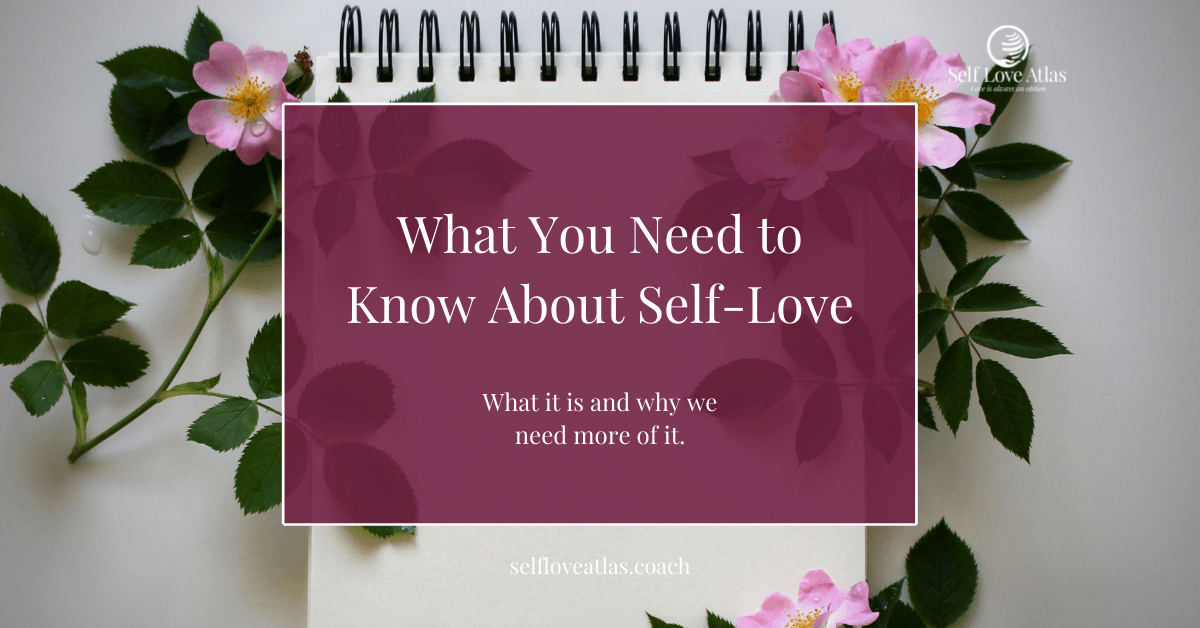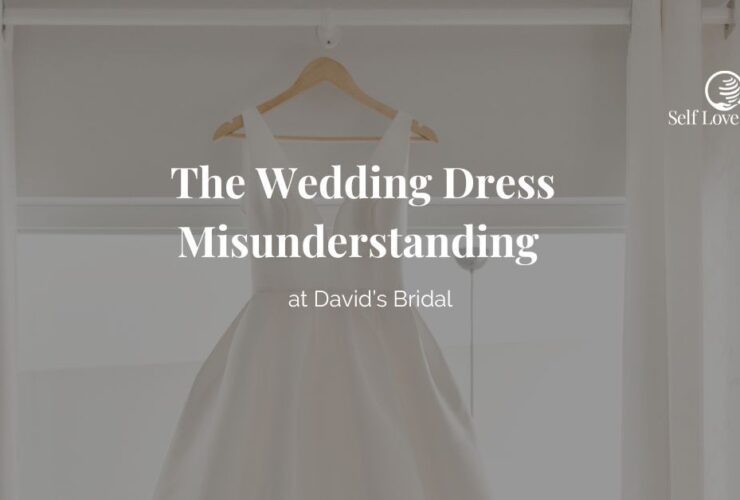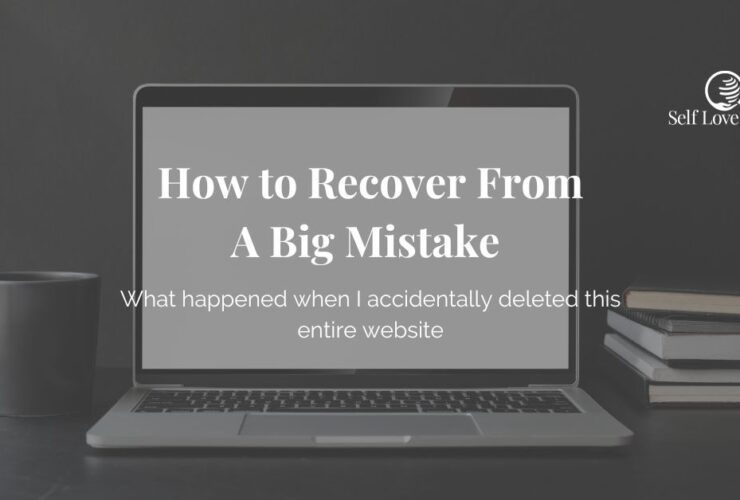What You Need to Know About Self-Love
Self-love is one of the most important tools you will ever use in your search for fulfillment in life. And yet, the concept of self-love seems to be unfamiliar to most people.
Self-love isn’t about selfishness, self-obsession, cockiness, self-importance, or some sort of superiority complex. It’s about developing a deep belief that you are enough as you are.
In this post, I’ll provide an in-depth explanation of self-love: what it is, and why we all could use a little more of it.
What is Self-Love?
To start, self-love is not the same as self-care. Self-care is something you do to take care of yourself, while self-love is something to work towards; and once achieved, it is something to be felt.
But what does it mean to feel self-love?
Well, imagine treating a person (or pet) whom you love in a kind and loving way. Perhaps your actions towards them reflect that you listen to their needs, respect their boundaries, pay attention to their likes and dislikes, and keep their well-being (i.e. a state of happiness and health) in mind whenever you’re with them.
What does that feel like? Does it feel good? Does it feel purposeful?
Why does it feel good?
Is it because you love them?
If you truly love someone, you probably treat them kindly not because you have to, but because you want to. You do it because you genuinely care about their well-being. In other words, because you have love for them.
Having self-love is the same thing, except that feeling is directed towards yourself. Self-love involves valuing, respecting, and caring about your own happiness and well-being as much as you would for your loved ones.
Self-love begins when we observe our actions and words with compassion as if we were our own best friend.
— Sara M Bosworth
People who have self-love show regard for their own needs and well-being because they know it’s just as important as taking care of other people.
Don’t believe me? Consider the safety instructions given on an airplane before takeoff. In case of an emergency, flight attendants show all passengers how to put on the oxygen masks that are located in the overhead compartment. Every time the flight attendants deliver these instructions, they tell parents of small children to put on their own masks first before helping someone else.

This is because, if the parent fails to meet their own needs for oxygen, they may not be capable of helping their own children. If the parent instead chooses to help the child first, the action (which might seem noble and kind at first) might actually be a form of needless self-sacrifice and disable the parent from helping their child any further.
Self-love is about making sure our basic needs are met, so that we can be more helpful, happy, and present not only with ourselves, but also with the people we care about.
Maintaining and improving our own happiness and well-being (mentally, emotionally, and physically) benefits other people for two main reasons:
- It increases our capacity to help other people.
- It has a contagious/spillover effect on the people around us.
Exercise: Let Yourself Smile
Here’s a small suggestion for testing out the contagiousness of happiness and well-being. Seek out something you enjoy, whether it’s your favorite food, a board game, a place with a nice view at a park, or even a song that puts you in a good mood. Then, invite someone you care about to experience that thing with you. While experiencing it, express to that trusted person how much you like it. Smile, and share what seems good and enjoyable in that moment. See if you notice a change in the other person’s mood. Notice if they smile back at you; notice if they enjoy your happiness when they get to share it with you.
That is the contagiousness of happiness.
Self-Love Involves Respecting Your Own Existence.
When a person has achieved self-love, they become comfortable setting healthy boundaries with their time, energy, and other people. Setting boundaries for oneself is a sign of self-worth because it demonstrates that a person recognizes the value and importance of their own well-being.
Each person, at the bare minimum, has inherent worth (yes, including you).
Yet, so many people spend massive amounts of time putting themselves down and feeling like they aren’t good enough as they are. They spend most of their lives looking in the mirror, seeking to change anything that will make them worthy of love and acceptance. But the truth is, they are already worthy (we’ll dive into this more in future posts).
But why do we doubt our inherent worth? Why is self-love so hard to achieve? Why do so many of us always feel like we are “falling short” in one way or another?
The answer is culture.
Our Culture Teaches Us That We’re Not Enough
If you feel like you aren’t “good enough” in some way, it’s probably less due to personal failings and more due to our consumerist culture. Or more specifically, our culture’s depiction of a desirable human being.
Every moment of the day, we are bombarded by information on the news, TV, and social media. All of it is telling us how we “should be.”
For example, desirable TV and movie characters (heroes, detectives, princesses, geniuses, etc.) all tell us that we are not attractive enough, not smart enough, and not anything worth desiring unless we can live up to those high (and often unrealistic) expectations.
Meanwhile, advertisements show us all the things we “need” but don’t have. They show us tastier food, better clothes, better homes, more income, more stuff, more, more, more.

Some sociology theorists such as Jerry Mander see television programming as being intentionally designed to induce self-hatred, negative body image, and depression. In addition, they note that the products featured in advertising are then suggested as cures to those same negative emotions. In other words, teaching people to hate themselves is a very profitable business. And it’s so pervasive in our culture that it has become very difficult not to fall victim to it.
To be clear, I’m not implying content on the internet and TV are always bad. There are plenty of things people derive genuine joy from in those spaces. But the side effect of being constantly bombarded with images of ideal life and ideal human beings is that we learn we will never be enough because there is always more to be had.
I believe these cultural messages are the main reason so many of us feel badly about ourselves all the time.
To help illustrate this problem, consider the plot of the DreamWorks movie, “Robots.”
The majority of the characters in “Robots” are old-hand-me-down robots who have spent much of their lives facing insecurities about the parts they’re made of. Many of them wish they could have newer, shinier, and better parts, but to get them, they would need to give up much of themselves (including their bodies and their financial stability).
The antagonist of the story is a shiny-new-looking robot named Ratchet. Ratchet owns a huge corporation (Bigweld Industries), which uses marketing to tell average robots they are not enough as they are. Ratchet knows that if regular robots feel badly enough about themselves, they will be willing to pay everything they have to buy the company’s shiny new “upgrades” and make themselves “better.” So, the company goes out of it’s way to make robots feel awful so they buy upgrades and drive profits through the roof. Their slogan, “Why be you, when you can be new?” bluntly illustrates this strategy by implying that being anything other than “New” is “Bad.”
Do you see the similarities here? This story is based on consumerist culture. It is a simplified and animated version of the economy we were born and raised in. And the impact of this strategy is present in your life, whether you like it or not.
You Were Enough From The Moment You Were Born
But you likely have a hard time believing this because you’ve been told, through millions of subtle messages, that “something is wrong with you.”
When there isn’t, you aren’t inherently bad because you “lack” something, you just are. You exist. And that alone is a miracle. It’s worth celebrating every single day.
How are we supposed to celebrate? Simple. By allowing ourselves to exist and experience this life that has been gifted to us, and doing so without judgement; we can celebrate every day by taking the time to observe and learn about ourselves and the world we’ve been dropped into.
But instead, many of us spend our lives staring into our bathroom mirrors thinking about how we want to zap the hair and zits off our faces, smooth the wrinkles, cure that exhausted look in our eyes; get the job that other people will respect, get more followers on social media, more money in the bank, more, more, more, of anything and everything we could possibly do to hopefully be enough one day.
Sorry to break it to you, but none of that stuff will ever be enough…
The one thing that will finally be enough, is a measure of self-love.
The good news,
If you feel bad about yourself sometimes, it’s not your fault. For the most part, it is a side effect of a system that is bigger than you. Luckily for us, we have the power to unlearn what culture has taught us.
The bad news,
“Unlearning” takes a lot of effort.
If we want to love and accept ourselves for who we are, we have some work to do. Culture has taken our self-love and placed it at the top of a mountain to stop us from achieving it. So, if we are ever going to feel sustainable happiness and fulfillment, we have to find a way to climb to the top of that mountain and shout “I WAS ENOUGH THIS WHOLE TIME.”
But climbing a mountain like that isn’t easy. In this case, the mountain isn’t a physical obstacle, but a psychological one.

That’s why I started Self Love Atlas. To provide a place to overcome those psychological obstacles, to provide a map up the mountain, strategies to unlearn self-doubt and self-loathing, and a clear path towards a deep sense that you are inherently, fully, enough as you are.
Thanks for reading. I hope you decide to join this journey up the mountain with me as I continue my own “unlearning” process too.
Did this post resonate with you? If so, I’d love to hear from you! Leave a comment or send me a message to share your thoughts. For more uplifting content, check out some other posts on my blog, follow me on instagram @morgan_barbret, or sign up for the Self Love Atlas Newsletter!
Cheers,
Morgan Rita Barbret






Excellent read, thanks Morgan ❤
Thanks for reading Brando!!! I miss you and appreciate you ❤️